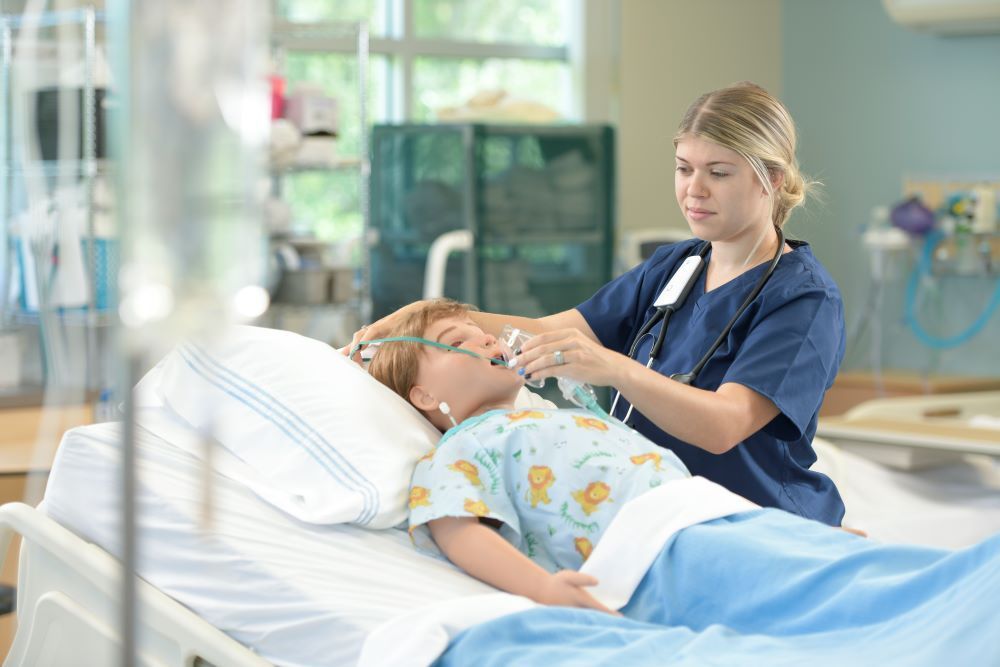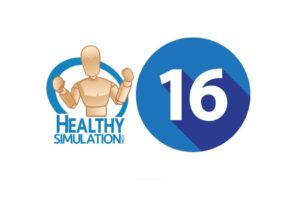CAE Aria Pediatric Simulator Supports Training for PALS, PEARS, APLS and More…
CAE Healthcare, which was just acquired by Madison Industries, delivers solutions to enhance pediatric care through Aria, a pediatric simulator. Medication errors are classified as one of the leading causes of critical harm in pediatric patients. According to the National Library of Medicine, an estimated 7.5 million preventable medication errors occur annually among pediatric patients in the United States. The pediatric population is especially vulnerable and at risk for preventable errors. This HealthySimulation.com article will explore CAE Healthcare’s pediatric simulator, Aria.
According to The Joint Commission, medication error statistics are high because:
- Most medications require different volumes or concentrations before being administered to children.
- Healthcare settings are primarily built around the needs of adults and lack trained staff oriented to pediatric care.
- Children are usually less able to physiologically tolerate a medication error due to the continuous development of renal, immune, and hepatic functions.
- Many young children cannot effectively communicate the adverse effects of medications to providers.
Poor communication during patient transport also contributes to medication errors, including communication between prehospital and emergency department staff, during shift changes, and communication between hospital staff and family members.
Sponsored Content:
Preventable Pediatric Mortality Rates
Respiratory complications such as pneumonia and influenza frequently contribute to children’s mortality. According to UNICEF, pneumonia claims the lives of over 700,000 children under five yearly or around 2,000 daily.
A study by the National Library of Medicine attributes premature closures, when a physician prematurely ends the decision-making process without considering reasonable alternatives after an initial diagnosis, as a cognitive error when caring for patients. These errors can result from inexperience, fatigue, or lack of training.
Simulation-Based Training and Learning Outcomes
Sponsored Content:
Advanced simulation and virtual reality solutions help prepare learners and practicing healthcare professionals for various pediatric needs in a risk-free environment. While in the controlled environment of healthcare simulation, learners can practice clinical procedures, identify the nature of the medical condition, and experience patient responses that mimic real-world situations.
This approach helps build long-term assessment skills, bolsters confidence to provide immaculate care, demonstrates diverse conditions that may be encountered in real healthcare facilities, and provides the opportunity for immediate feedback to recognize errors.
A systematic review by Patient Safety Network analyzed the results of more than 600 studies that evaluated simulation training programs and found significant associations between simulation training and improved outcomes of knowledge, skills, and behaviors.
Healthcare Simulation That Impacts Pediatric Care
CAE Healthcare offers a wireless and tetherless pediatric manikin for healthcare simulation. Designed to prepare learners for various levels of pediatric care, CAE Aria, features an advanced airway that can be controlled and manipulated to help improve intubation skills. The high-fidelity manikin offers the ability to use different combinations of tongue-swelling, post-pharyngeal swelling, and laryngospasms, as well as needle cricothyrotomy and a variety of supraglottic devices.
This level of realism helps learners and practicing professionals sharpen their skills in preparation for pediatric respiratory situations, including the flu, RSV, and complications of the common cold. CAE Aria has two fingers with fingertip reservoirs for obtaining and testing blood sugar levels to allow for pre-treatment and post-treatment values to enhance the scenario’s realism.
Simulating a 7-year-old child, CAE Aria can be used with length-based measuring tools such as Broselow tape to help learners determine clinical sizes and dosing of pediatric medications. Offering interchangeable genitalia for diverse training, CAE Aria helps:
- Assess verbal cues like confusion, anxiety, stress and pain
- Learn airway management skills
- Conduct neurological evaluations
- Train for various pediatric emergencies
Experiencing these encounters gives learners the opportunity to become well-trained staff for pediatric care and identify any adverse effects of medications in children who are unable to communicate effectively.
CAE Aria also supports training and education for Pediatric Advanced Life Support (PALS), Pediatric Emergency Assessment, Recognition and Assessment (PEARS), and Advanced Pediatric Life Support (APLS) certifications.
Common Respiratory Illnesses Requiring Pediatric Care
Although pediatric care is administered year-round, the number of children visiting healthcare facilities peaks during the fall and winter seasons due to the common cold, influenza (flu), respiratory syncytial virus (RSV), and other viruses that target the lungs and airways. According to Stanford Medicine for Children’s Health, children are more likely than adults to get a cold due to a weaker immune system, close contact with other children at school or daycare, and because they are more prone to touch their eyes, nose, or mouth. Potential complications of the common cold alone may include ear infections, sinus infections, pneumonia, and throat infections.
According to the National Foundation for Infectious Diseases, the flu leads to hospitalization in an estimated average of 20,000 children under the age of five each year due to complications.
The virus easily spreads from one person to the other, with children being major spreaders because they pass on more of the virus for a longer period of time than adults.
Like the flu, RSV is a highly contagious virus. The Centers for Disease Control and Prevention reports between 58,000 and 80,000 children younger than five-years-old are hospitalized each year in the United States due to RSV, which can lead to bronchiolitis, an infection that causes inflamed airways and makes it difficult to breathe. If the infection travels to the lungs sacs, it can result in pneumonia.
CAE Healthcare Aria is the solution. Aria allows learners to practice providing care to pediatric patients with RSV, flu, and other respiratory illnesses. Aria will assist learners to develop the knowledge, skills, and attitudes to provide quality care and improve healthcare outcomes.
View the HealthySimulation.com LEARN CE/CME Platform Webinar Setting Up Your Healthcare Simulation Center for Learner Success with CAE Healthcare to learn more!
Make A Difference in Your Healthcare Facility
During a visit to Tucson Medical Center (TMC) for Children in Tucson, Arizona, members from CAE Healthcare got the chance to see how the institution utilizes CAE Aria in their simulation program to advance patient safety.
At TMC, best practices are put into action by means of policy, procedure, and algorithms, which are then practiced via simulation scenarios with team training to promote critical thinking. Expert physicians, nurses, and clinical staff train together quarterly to deliver excellent outcomes and compassionate care to children and their families in Southern Arizona.

Stacie Wood, Principal CAE Healthcare Training and Consultant, shares that a focus on high-quality simulation promotes the best patient outcomes.
“We are committed to offering innovative and evidenced-based solutions for training, education, and consultation,” Wood said. “We appreciate the opportunity to help you increase patient safety and improve healthcare outcomes.”
About CAE
CAE equips people in critical roles with the expertise and solutions to create a safer world. As a technology company, CAE digitalizes the physical world, deploying software-based simulation training and critical operations support solutions. Above all else, CAE empowers pilots, cabin crew, airlines, defense and security forces, and healthcare practitioners to perform at their best every day and when the stakes are the highest. Around the globe, CAE is everywhere customers need them to be, with more than 13,000 employees in approximately 250 sites and training locations in over 40 countries. CAE represents more than 75 years of industry firsts—the highest-fidelity flight, mission, and medical simulators and training programs powered by digital technologies. They embed sustainability in everything they do. Today and tomorrow, CAE will make sure their customers are ready for the moments that matter.
Teresa Gore, PhD, DNP, APRN, FNP-BC, CHSE-A, FSSH, FAAN – Dr. Gore has experience in educating future nurses in the undergraduate and graduate nursing programs. Dr. Gore has a PhD in Adult Education, a DNP as a family nurse practitioner, and a certificate in Simulation Education. Dr. Gore is an innovative, compassionate educator and an expert in the field of healthcare simulation. In 2007l Teresa started her journey in healthcare simulation. She is involved in INACSL and SSH. She is a Past-President of INACSL and is a Certified Healthcare Simulation Educator Advanced (CHSE-A). In 2018, she was inducted as a Fellow in the American Academy of Nursing (FAAN). In 2021, she was inducted as a Fellow in the Society of Simulation in Healthcare Academy (FSSH) and selected as a Visionary Leader University of Alabama at Birmingham School of Nursing Alumni. During her career, Dr. Gore has led in the development and integration of simulation into all undergraduate clinical courses and started an OSCE program for APRN students. Her research interests and scholarly work focus on simulation, online course development and faculty development. She has numerous invited presentations nationally and internationally on simulation topics.
Sponsored Content:
















